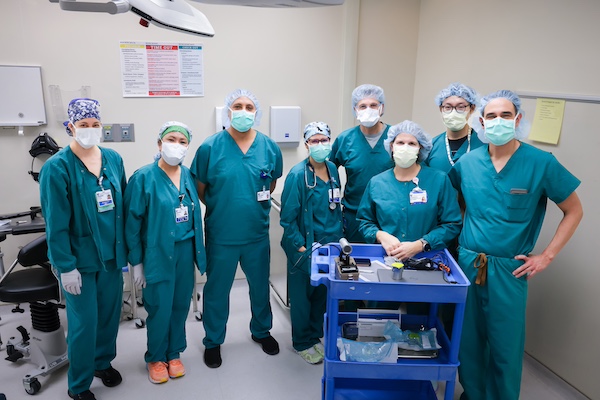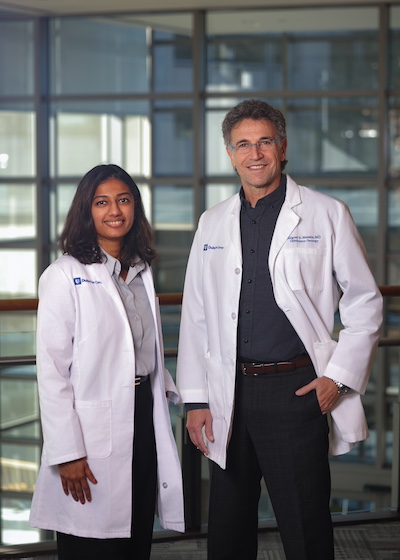
Advancing ocular oncology through the power of partnership
Ocular Oncology is a distinct subspecialty of ophthalmology which focuses on the diagnosis and treatment of cancers that impact the eye, orbit (eye socket) and eyelids. The Division of Ocular Oncology was formally established at Duke Eye Center in Fall 2023 after more than 10 years of providing treatment for eye cancer. Under the leadership of Miguel Materin, MD, professor of ophthalmology and professor of radiation oncology, the Division of Ocular Oncology is dedicated to providing specialized care for children and adults battling benign and malignant tumors of the eye.
Originally part of the retina division, the demand for treatment has only increased over the past several years. Steadily expanding to more than 500 patients visiting Duke Eye Center each month for ocular oncology support, the need for a division solely devoted to eye cancer was clear.
“Almost all of our patients are referred to us from other specialties within ophthalmology or from caregivers in other fields including melanoma, breast cancer, neuro-oncology, radiation oncology and pediatric oncology,” said Materin. “While we often treat patients from other departments within Duke, we also see a number of referrals from other hospitals across southeast, and the country.”
Pioneering Treatments
In June 2023, Duke became one of only three treatment sites in the U.S. certified to utilize the novel high dose-rate (HDR) yttrium-90 (Y-90) brachytherapy procedure.
The Y-90 procedure, cleared by the Food and Drug Administration for episcleral brachytherapy of ocular tumors and benign growths, involves placing a disc of yttrium-90 on an applicator then directly on the eye. This approach effectively treats small lesions from a variety of different diseases and conditions, including conjunctival squamous cell carcinomas, keloids and melanomas. Remarkably, most procedures are completed within 5 to 10 minutes.
“We’re honored to have been chosen as one of the first centers in the country to offer this innovation in patient care,” said Materin. “Y-90 is an incredibly less-invasive procedure that replaces traditional therapy and will positively contribute to the evolution of ocular oncology on a national scale.”
In collaboration with the Department of Radiation Oncology at Duke, Junzo Chino, MD, associate professor of radiation oncology and director of brachytherapy, has worked with Materin to successfully perform the Y-90 procedure on ten patients, with plans for many more in the future.

During the initial consult, the patient is evaluated to determine if they are a good fit for the Y-90 procedure. If so, using tumor measurements, the team calculates the time to the appropriate depth and then provides quality assurance during pre-planning. In the operating room, Chino attaches the Y-90 disc to the wand, then ophthalmologist delivers the treatment to the patient. Physicists monitor the time as the source is applied. The procedure is over in a matter of minutes.
“All brachytherapy is a team sport,” said Chino. “None of this happens without a high degree of collaboration between the surgeon, the radiation oncologist, a dedicated physics team, as well as the nurses, surgical coordinators, recovery staff and assistants in the operating room. Every role in this group is absolutely critical to ensure we’re on top of our game and each procedure is done as safely and effectively as possible.”
The collaborative team in ophthalmology and radiation oncology continue to pave the way for advancements that not only improve patient outcomes but also set new standards of excellence, positioning Duke as a pioneering force in the development of eye cancer treatments.
Expanding Capabilities
In response to the growing need for ocular oncology care at Duke Eye Center, the division is host to a thriving training ground, including a one-year Ophthalmic Oncology and Pathology Fellowship program. The fellowship embraces a multidisciplinary approach to medical and surgical management of a wide range of ophthalmic cancers, along with a robust research component. Since 2017, six ocular oncology fellows have trained with Materin. These physicians have hailed from outside institutions around the globe.
Upon completion of the program, the most recent fellow, Arpita Maniar, MBBD,MD – also a skilled oculofacial plastic surgeon and ophthalmologist – became a full-time member of the Ocular Oncology division and is now working alongside Materin, as an attending physician and Duke faculty member. Together, the two are helping train ophthalmology residents, providing hands-on patient care and contributing to research.

“The Duke Ocular Oncology fellowship was a tremendous opportunity for me to gain specialized skills and cultivate a deep knowledge of this rare field of cancer,” shared Maniar. “The support of the Duke Ophthalmology team and the collaboration with oncologists from other cancer-related disciplines makes this fellowship impactful, and allows us to provide our patients with the highest level of care.”
Essential to the ability of the Ocular Oncology division to train the next generation of practitioners and deliver much-needed therapy to patients, is the cooperation and teamwork they enjoy with the Duke Cancer Center or other nationally-recognized treatment facilities. Together with renowned cancer specialists from areas such as pediatrics, neurosurgery, radiation oncology, breast cancer and others, they are able to provide the highest level of care to patients who are battling the spread of disease or whose ophthalmic challenges have been triggered by other systemic treatments.